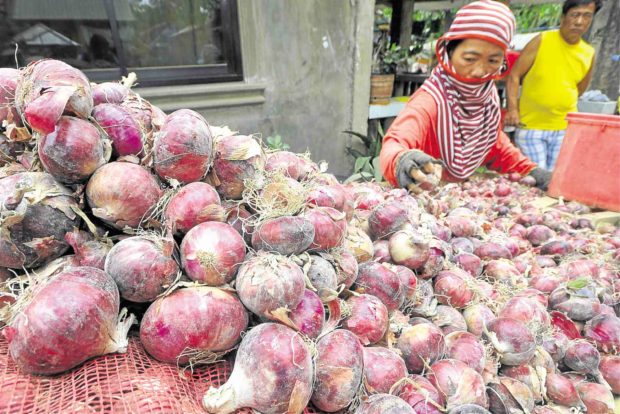
Onions are classified and sorted in Bayambang town, Pangasinan province, before these are delivered to local markets or stored in warehouses. —INQUIRER file photo / WILLIE LOMIBAO
MANILA, Philippines – The “peak season” of local onions is expected in January 2023, the Department of Agriculture (DA) said Tuesday.
DA deputy spokesperson Rex Estoperez took note of the soaring cost of onions, reaching P520 per kilogram.
Despite the extraordinary increase in onion prices, Estoperez said the DA has no plans to import agricultural products because doing so would encourage smuggling such products from other countries.
Soon, he noted, the country’s onion crop would be ready for harvest.
“Ayaw natin i-tolerate iyong smuggling. Kapag sinabi nating mag-issue tayo ng import permit, sa paligid lang iyan, ilalabas lang nila iyong smuggled goods. Kung aasa naman tayo sa mga local producer, malapit na iyan. For example, iyong sibuyas, January – magsisimula na iyong peak season nila,” Estoperez said in a Laging Handa public briefing.
(We don’t want to tolerate smuggling. But, if we issue an import permit, the smuggled goods will surface from just around the corner. And if we depend on local producers, the peak season for agricultural products is already nearing. For onions, it’s in January.)
Estoperez said the DA had not made any projections of the volume of onions that may be produced in January.
Asked about the DA’s efforts in mitigating the effects of the skyrocketing cost of agricultural goods, Estoperez said they are pinning down optimal zones where specific commodities are most suitable for production.
“Considering iyong high-value commercial crops sa value chain natin, i-identify natin alin ang zones na hindi tinatamaan [ng bagyo], resilient siya at doon ang suitable na area para doon,” he explained, pointing out that the “lechon manok syndrome” – where people latch on and copy what is popular – is still a common mentality in deciding what crops to plant.
(Considering the high-value commercial crops according to our value chain, we are identifying the zones that aren’t frequently hit by storms and are also resilient and suitable for planting such crops.)
The DA, according to Estoperez, has been looking into possible interventions to protect both farmers and consumers in agricultural trade.
“Tinitingnan natin kung saan tayo nagkukulang even though alam natin na may imperfections sa sistema natin,” he added.
(We’re looking at where we’re falling short even though we already know there are imperfections in our system.)
Estoperez said DA must also improve transporting, storing, and packaging of farmers’ goods.
“Iyon iyong mga nakikita nating interventions na kailangan i-improve natin kasi kung hindi ma-improve ito, including iyong resiliency natin sa climate change, hindi natin ma-address ito. Patuloy lang mangyayari ito,” he said.
(These are the interventions we’re looking towards improving because if we don’t do this and boost our climate change resiliency, we won’t be able to address the problem, and it will continue happening.)
Recent calls have been made for the Bureau of Customs to pursue non-bailable, economic sabotage charges against those responsible for a spate of operations in which authorities seized imported onions and other agricultural items.
Senator Imee Marcos, sister of President and concurrent DA chief Ferdinand Marcos Jr., has since sought a Senate investigation on the high onion prices.
RELATED STORIES:
Red onions for P300 per kilo: Supply not solely to blame
Senate probe of high onion prices pushed
Crush agri-smuggling gangs now: BOC urged to get tough and send ring members to jail